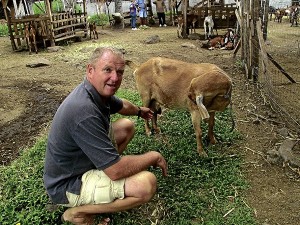DUMAGUETE CITY—It didn’t come as a surprise to many when Georg Bender, a former fashion designer from Germany, decided to build a dive resort in Puerto Galera in 1993 after an extended dive vacation.
His friends didn’t raise an eyebrow when he opened another dive resort in Dauin town, Negros Oriental following the success of his first venture.
But his friends were shocked when they learned of his new passion: goat farming.
His stock has since grown close to 500 goats, producing high quality milk and meat.
The love affair started five years ago when Bender, 55, bought a five-hectare property in Dauin, which was originally a mango orchard-coconut plantation.
A former employee, Bender from Switzerland, who took care of the development of the Dauin property, also brought in 15 head of boer goats—descendants of a breed from South Africa which is good for meat production.
Bender then thought of taking care of the goats as a new hobby.
Later, someone introduced Bender to Anglo-Nubian goats. Also called Nubians, these are dairy goats that produce rich milk for a variety of dairy products, including some of the world’s finest cheeses.
The male Nubian goats may grow as heavy as 90 kilos and 35 inches tall. Nubians have elongated and floppy ears.
With the help of veterinarian Ed Beso, who is also manager of a farm called The Goatary, Bender crossbred his goats to obtain breeds close to 100 percent pure-bred.
“In the beginning, we would not open the farm to visitors, simply because our stock was not of good quality. Now, we are enthusiastic about our breeding stock. It shows that, over the last five years, all the hard work and the big investment has resulted in one of the most outstanding goat farms in the country,” Bender proudly says.
“Of course, this time, I feel this is not a hobby anymore.”
Bender and his farmhands—three Dauin residents for every 40 goats—have developed a close relationship with the goats, each of whom they call by name, and whose statistics—such as breed, characteristics, dairy value, production capacity, and offspring—are meticulously recorded in a database.
The farmhands monitor every doe to ensure that the milking schedule is not missed.
“You only have a small window of two hours where the does need to be milked. You miss that even once, and that doe may lose her ability to produce that much milk for that particular lactating period,” Bender says.
Goats at the Goatary produce one to two liters of milk a day. Dairy products—such as milk, cheese, butter, ice cream and yogurt—from the Anglo-Nubian stock are known for its high butterfat content and smooth flavor.
“When the local households start tending to better quality goats like these Anglo-Nubian, then we can also begin to understand how to better cook goat meat for food,” Bender explains.
He says cooked goat meat does not have to have that certain pungent smell that turns not a few people off.
There are gourmet ways of preparing goat meat aside from the all-too-common kaldereta (goat stew with tomato paste), a favorite fiesta fare.
The seemingly pedestrian goat meat (called chevon, or colloquially referred to as mutton) can be baked, grilled, barbecued, minced, canned, fried, curried, made into sausage, or cooked like the all-time Filipino favorite lechon (roasted suckling pig).
His wife Alona is busy making goat cheese at home, and concocting various flavors.
So far, she has gotten a lot of thumbs-up from local consumers for her goat cheese in pimiento, basil, onion & chives, and celery, to name a few.
Bender says goat meat, goat milk, goat cheese, and goat yoghurt are “not only important for people’s health, but that their production is manageable, doable, and profitable.”
He says that although he has no figures to prove this yet, he is beginning to realize how lucrative the business is.
Bender has registered the trademark for his dairy—The Goatman—which he hopes will be a success in major markets in the country.
“There will be a big demand for goat products when people begin to realize its health benefits,”notes Bender.
Milk, for example, must be considered “food” rather than merely a drink, whose medicinal and health value is currently “grossly underestimated in the local community.”
Goat milk is documented as a good source of calcium, protein, vitamins and minerals for those who have allergies, or are lactose-intolerant.
Goat meat, on the other hand, is the leanest, and contains even less fat than chicken.
Bender and his veterinarian-manager are currently trying to maximize the use of whey (the watery part of curd, which is the soured milk used for making cheese) as vinegar, and as a protein drink for a healthy diet.
Goat manure is also being cured in the farm’s vermi composting site to fertilize the napier grass grown on the farm.
“Goats can’t just eat any grass. For good nutrition, they have to be fed the good kind of grass and legume plants and fodder. And they have to have it in sufficient quantity at the right time,” Bender explains.
It may take a while before the goatherd and his workers make it big in Negros Oriental.
But Bender is unfazed.
“If we could produce at least a good percentage of the consumption demand for goat meat, goat milk, and goat cheese, we would have done our job of being self-sufficient,” Bender says.


